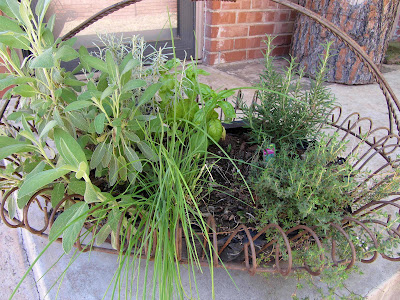Let's Dish about the Good Earth!
Not Earth Day, I think I got off track here, but I was thinking Pearl S. Buck, who spent many years in China and who wrote frequently on the topic of China.
The notes from book are from http://www.sparknotes.com/lit/goodearth/summary.html - Spark Notes.
Wang Lung is a poor young farmer in
rural, turn-of-the-century China. During the time in which the novel takes
place, Chinese society is showing signs of modernization while remaining deeply
connected to ancient traditions and customs.
When Wang Lung reaches a
marriageable age, his father approaches the powerful local Hwang family to ask
if they have a spare slave who could marry his son. The Hwangs agree to sell
Wang a 20-year-old slave named O-lan, who becomes his wife. O-lan and Wang Lung
are pleased with each other, although they exchange few words and although Wang
is initially disappointed that O-lan does not have bound feet.
Together, Wang Lung and O-lan
cultivate a bountiful and profitable harvest from their land. O-lan becomes
pregnant, and Wang Lung is overjoyed when O-lan’s first child is a son.
Meanwhile, the powerful Hwang family lives decadently—the husband is obsessed
with women, and the wife is an opium addict.
Because
of their costly habits, the Hwangs fall on hard times, and Wang Lung is able to
purchase a piece of their fertile rice land. He enjoys another profitable
harvest, and O-lan gives birth to another son.
Wang Lung’s new wealth catches the
attention of his greedy, lazy uncle. Custom dictates that Wang Lung must show
the utmost respect to members of the older generation, especially relatives, so
he is forced to loan his uncle money despite knowing that the money will be
wasted on drinking and gambling. The Hwang family’s finances continue to
falter, and the Hwangs sell another tract of land to Wang Lung.
After O-lan gives birth to a
daughter, a terrible famine settles on the land. In the midst of this crisis,
O-lan gives birth to another daughter. She strangles the second girl because
there is not enough food to feed the baby and the rest of the family.
Wang Lung is forced to take his
family to a southern city for the winter. There, O-lan and the children beg
while Wang Lung earns money by transporting people in a rented rickshaw. They
earn just enough money to eat. Wang Lung begins to despair of ever making
enough money to return to his land. He and O-lan briefly consider selling their
surviving daughter as a slave.
Eventually, a group of poor and
desperate people ransacks a rich man’s home, and Wang Lung and O-lan join them.
Wang Lung steals a pile of gold coins. With this new wealth, he moves the
family back home and purchases a new ox and some seeds.
O-lan had stolen some jewels during the
looting. Wang Lung allows her to keep two small pearls, but he takes the rest
and hurries to buy three hundred acres of Old Master Hwang’s land. O-lan gives
birth to twins shortly thereafter. The couple realizes that their oldest
daughter is severely retarded, but Wang Lung loves the child dearly.
Wang
Lung hires laborers to plant and harvest his land. He enjoys several years of
profitable harvests and becomes a rich man. When a flood forces him to be idle,
he begins to feel restless and bored. He finds fault with O-lan’s appearance
and cruelly criticizes her for having big feet.
He becomes obsessed with Lotus, a
beautiful, delicate prostitute with bound feet. Eventually, he purchases Lotus
to be his concubine. When O-lan becomes terminally ill, Wang Lung regrets his
cruel words and comes to appreciate everything his wife has done for him.
Meanwhile, to lessen the demands of
his uncle and his uncle’s wife, who have moved their family into his house and
continued to exploit his wealth, he tricks them into becoming opium addicts.
Eventually, Wang Lung rents the Hwangs’ house and moves into it with his family,
leaving his own house to his uncle’s family.
After O-lan’s death, Wang Lung’s
sons begin to rebel against his plans for their life. They do not want to work
as farmers and do not have his devotion to the land. Furthermore, his first and
second sons often argue over money, and their wives develop an intense
animosity toward one another.
In his old age, Wang Lung takes a young slave,
Pear Blossom, as a concubine. She promises to care for his retarded daughter
after his death. In time, Wang Lung is surrounded by grandchildren, but he is
also surrounded by petty family disagreements.
By the end of the novel, despite
Wang’s passionate dissent, his sons plan to sell the family land and divide the
money among themselves, signaling their final break with the land that made
them wealthy.
The overarching theme of The Good Earth is
the nourishing power of the land.
Cast:
The Good Earth - Pearl S. Buck 1931
Tablecloth - Made by Moi
Napkins - very old
Brass chargers - eons old themselves
Plates - Midnight Trellis plates by Home Essentials and Beyond also used
HERE and
HERE
Bowls - Waechtersbach
Flatware - Siam, gift from mom-in-law
Teapot and cups - from mom-in-law
Chopsticks and rests - JCPenney
Center stand - GardenRidge, Dallas
Center bowl - Made in Portugal - Horchow's
Please help take care of our earth, it is a good earth! Linking up with Cuisine Kathleen's Let's Dish party on Wednesday evening. Also linking to Susan's Tablescape Thursday party on Thursday.. Cya there!
Thank you to all my faithful readers and followers. Seeing your comments makes my day.. thank you so much!






















































